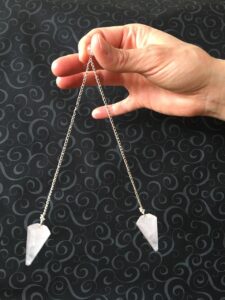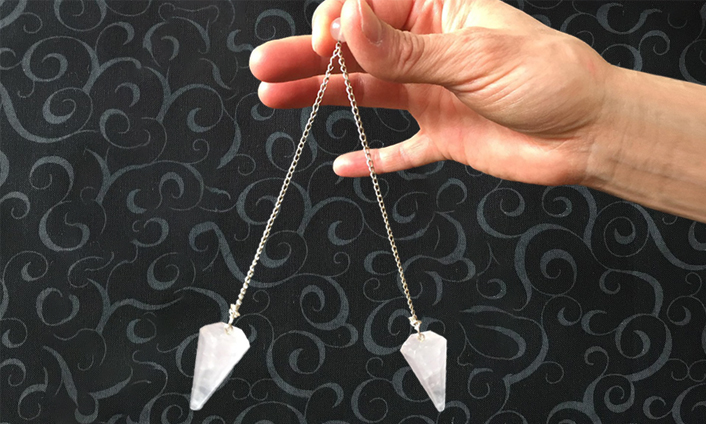How to Approach Personal Transformation Like a Boss - Part 3
In Part 1 of this series I discussed The BIG 5 Personality Traits Theory in relation to goal achievement. In Part 2 of this series, I walked you through a few step-by-step processes that can work as a powerful mechanism to align your BIG 5 personality traits to the change you seek to accomplish and get all the buy in and support you can glean from them while you pursue a desired change. If you missed either or both of those articles you can click on this link to be taken to Part 1 or this link to be taken to part 2. However, you are welcome to jump right in here and catch up on those other two posts, later.
In this article I will introduce you to one activity that can help you work through any resistance to that change you want to make. This article will be shorter, as I talk about how to work with a pendulum. But first, you might be wondering when or why working with a pendulum might be helpful to you.
In order to gain insight around many of the questions that are relevant to navigating your life, or, as in this article’s context, the specific changes you desire to achieve, you can run a gentle query through your subconscious to confirm you have all parts on-board, utilizing a pendulum. First and foremost, a pendulum is a tool that can help you communicate and glean answers to well-framed yes or no questions. Work with pendulum when you:
- Want to interview or gain more insight by speaking specifically with any one member of your BIG 5 (O.C.E.A.N) or with your subconscious.
- Need to make decisions…anything from little to big decisions.
- Want to figure out how to structure your approach to something that is currently very abstract or unfamiliar.
- Want to resolve issues and overcome challenges in your life.
- Want to ease your mind about something you may be overthinking, worrying over or ruminating about.

What Is a Pendulum?
A pendulum can be any kind of pendant hanging on a chain or string and has weight to it, at the end. A pendulum can be made of metal, a crystal, plastic or even a paper clip on a string will work just fine, in a pinch. You can think of a pendulum as merely a conduit or a tool that helps translate ideo-motor signals from your subconscious.
Steps to Pendulum Work
When you begin to work with your pendulum, always keep in mind that you are communicating with your inner wisdom. As you prepare to hold that conversation, you will need to frame your yes or no questions in a clear and concise a manner as possible.
1. Grab your pendulum and a piece of paper.
For beginners I recommend using your pendulum with a visual guide and that is what the paper is for. You don’t need it, but it can help you as you become familiar with this practice. So, on that paper, go ahead and draw a big X, and then a circle around the X, (the circle doesn’t have to be a perfect circle). Depending on how you turn that piece of paper, what you have drawn may look a little bit like cross-hares that you would be familiar with when looking through a camera or telescope eyepiece. This is just going to act like a visual guide while you read signals brought to you by your subconscious mind.
2. Pick a nice quite spot to do your pendulum work.
Ideally you will want to be seated in front of a table you can work on. You’ll want to be in a distraction-free environment where you can devote your total focus to communicating and interpreting messages with your subconscious. (You don’t want to be caught up in multi-tasking.) You can add candles, turn on an aromatherapy diffuser, play some binaural beats, or other lyric-less music to help your brain go into an alpha state. Those are all optional, however, as you are equipped, on your very own, with a human body that is capable of getting into the alpha state with no outside accoutrements.
3. Charge the pendulum.
When you first start with your pendulum you want to charge it with your own energies. This is akin to charging up you cell phone to a USB charger, but charging your pendulum won’t take but just a few seconds. You simply hold the pendulum in one of your hands and run your fingers along the chain or string, and around the pendant. As you do this, take-in several deep breaths, long in-hales and long exhales. As you take those long breaths you take your brain, simultaneously, into an alpha state, opening up the lines of communications with your subconscious.
4. Ask for openness and clarity.
Now is a good time to just ask your spirit guides, guardian angels and any other nonphysical support guides to offer their support and resourcefulness to you. Ask that they help you in your enquiry by providing you with the capacity to interpret the answers from your inner wisdom with 100% accuracy.
5. Set your posture and hold the pendulum.
Sit-up straight, in front of a table, with your feet are flat on the ground. Place your paper out in front of you, on the table and you can set the elbow of your dominant writing hand next to the paper. You can hold the pendulum in a couple of different ways. I like to hold mine by taking the chain or string of the pendulum and placing it over my index finger and bracing the chain with my thumb pressed against it on my index finger. You could also hold the pendulum’s string or chain between your index and middle finger at the space right where those two connect. You’ll want to have the pendulum hover a few inches above the paper and you’ll want to have your hand, forearm and elbow stable but relaxed. In other words, don’t cramp up your hand, wrist, or forearm in an attempt to hold the pendulum in a perfectly still and rigid fashion. You want to steady your posture and maintain a comfortable position. A little movement, a little “hiccup” or “record scratch” is inevitable, just steady yourself again and proceed.
6. Discover your signals.
With your posture and pendulum in hand and ready for action you are going to ask your pendulum to show you a YES signal, then a NO signal, a MAYBE signal and a NEED CLARIFICATION signal. You should start to see the pendulum moving in a back and forth motion, or a circular motion, above your visual guide. I like to draw out the motion for each signal, on a sticky or small piece of paper, or even on the visual guide. This helps ensure I’m not misinterpreting. After your subconscious shows you those YES, NO, MAYBE, NEED CLARIFICATION signals thank your subconscious for communicating with you and for its part in this conversation. You are about to get some great intel here and you want to be truly appreciative. FYI, these are some signals that are common for people to discover:
- Front to back
- Side to side
- Clockwise circles
- Diagonal
- Counterclockwise circles
7. Test. your signals.
Now that you have your signals, you’ll want to test them by asking questions, that require a YES or NO response, and that you already know the answer to. Here are some example questions:
- Is my name (AMY)? I should get a YES Signal
- Is my name (Frank)? I should get a NO signal
- Is it (day of the week it truly is for you)?
- Is it (day of the week it really is not)?
- Am I holding a (object you are truly holding in other hand) in my hand?
- Am I holding a (false object) in my hand?
Then, BE SURE TO THANK SUBCONSCIOUS / INNATE WISDOM/ SPIRIT GUIDES for providing you with consistent communications. Get excited! You’re now in a very exclusive and wonderful position with access to some powerful intel that you can then utilize to make your life great. These answers are coming from that part of you that serves to protect you and keep you safe every day. You are truly about to have a conversation with new BFF…(your inner wisdom and amid all these spirit guides). Take a moment to really cherish all that love and support!
8. Ask your Questions.
Remember to ask YES or NO questions and to look out for the MAYBE or NEED CLARIFICATION signals.
There are two specifications that I forgot to mention this earlier, so I will mention them here. First, you don’t want to ask questions that are emotionally charged. Posing questions that are emotional typically cause miscommunication, either on the receiving end or the sending end. You want to ask emotionally neutral questions so that you’re sure to eliminate confusion. When I was just learning to use a pendulum, I was grieving a pregnancy loss. The questions I was posing, at that time were enveloped in extreme emotion, sadness, anger, hopelessness, etc. What ended up happening was that I was shouting, inside my head, the answers I was either expecting or fearing. My pendulum sort of froze or made very stunted movements, seemingly very cautiously. I realized very quickly that I needed to frame any questions in a more “matter-of-fact” way. So, I decided to ask questions in regard to the things I could work to control or manage in aiming to improve my diet and lifestyle habits. I learned how to ask what foods I’m either allergic to or that are not otherwise good for my body. Discovering things like should I work out on the elliptical machine at the gym today or does my body need a day to rest have been helpful and continue to help me learn how to best take care of myself.
Secondly, you want to ask questions in regard to yourself and not other people. The pendulum helps you to connect and communicate with your inner wisdom, therefore you are the central focus of this exercise. You can ask questions about how another person relates to you, how their energy impacts you and learn to gauge how truthful they are being with you. For example, you can ask your subconscious to help you discover which political candidate to trust, who will best represent you and work at creating or maintaining policy that matches your set of values. You can also ask your subconscious to help you understand your gut feelings around your relations with other people, medical professionals, loved ones, kids, co-workers, etc. You don’t want to ask questions about, let’s say an ex and their specific goings-on. Remember the questions result in a yes or no answer not a descriptive novella!
Having said all of this, you should know there are ways that a person working with a pendulum can act as a “surrogate” or a stand-in for a non-verbal person who is unable to ask questions verbally (for example a caregiver who wants to find out what their non-verbal baby or a person in an unconscious state might be having a reaction to.) and that skill is probably best learned by partnering with an expert in that area of pendulum work.
For the time being, get on to the business of asking your questions in regard to this change in your life that you really want to make. What questions can you ask that will help you discover how you can take really good care of yourself, honor all the parts working together as a team to grant you your wish and realize the shifts you wish for.
EXAMPLE QUESTIONS
- I’m really tired right now. Is this exercise routine that I scheduled going to be of (benefit to me)?
- I’m feeling stuck on this creative project. Will taking a 20 minute nap provide me with the space I need to move forward?
- Is the part of me that is resistant to this (CHANGE I WANT TO MAKE) because it feels unsafe?
- I’m feeling nervous about the surgery my doctor is recommending. Knowing what we know about the surgery, would getting this surgery benefit my ability to heal from this (health challenge)?
Always end your questioning by thanking and sending lots of gratitude to your subconscious!
9. Record the questions and answers, in a journal.
You can always come back and repeat the conversation, another day, if you find that you are unsure if you asked or read things correctly.
10. Strategize a plan to negotiate or accommodate any request.
This last step is up to you, my friend. When it comes to navigating toward a new behavior or a change in your life, you can decide whatever it is you do with your newfound insights, gleaned from the pendulum process. You may choose to negotiate or kindly ask that your Subconscious (or any part of yourself which may be holding back from allowing you to move toward a desired result) commit to a new behavior, for a specified time frame. And if it really doesn’t like the outcome, revert back to the well-known behavior while you explore other options. You can also ask what, if any, special accommodations could be agreed upon to permit the shift(s) in behavior. Your subconscious is never going to compromise your safety and wellbeing so when in negotiations, always ensure that what you are proposing will keep you safe and alive. If it is not, propose something else.
So that about wraps it up for using a pendulum and understanding subconscious signaling to communicate with your deep, innate wisdom. The pendulum is but one of several different methods you can use to tap-in to your inner wisdom for the purposes of achieving a much-desired goal.
Related Posts

How to Approach Personal Transformation Like a Boss – Part 2





